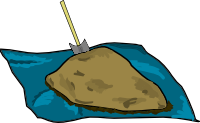Associations to the word «Soiling»
Noun
- Drought
- Fixation
- Alkali
- Fertilization
- Fungus
- Glove
- Texture
- Plough
- Solubility
- Gravel
- Root
- Limestone
- Insecticide
- Lime
- Residue
- Potassium
- Outcrop
- Cation
- Eucalyptus
- Respiration
- Richness
- Precipitation
- Microbiology
- Dung
- Extraction
- Weed
- Retention
- Tundra
- Basalt
- Landfill
- Grazing
- Manganese
- Accumulation
- Magnesium
- Usda
- Pollution
- Crust
- Geography
- Pest
- Pathogen
- Lichen
- Watering
- Stabilization
- Humidity
- Wastewater
- Phosphate
- Spore
- Sewage
- Wetland
- Calcium
- Farming
- Sulfur
- Hydrocarbon
- Clothes
- Mould
- Harvesting
- Flooding
- Sow
- Digging
- Sandstone
Adjective
Pictures for the word «Soiling»
Wiktionary
SOIL, noun. (uncountable) A mixture of sand and organic material, used to support plant growth.
SOIL, noun. (uncountable) The unconsolidated mineral or organic material on the immediate surface of the earth that serves as a natural medium for the growth of land plants.
SOIL, noun. (uncountable) The unconsolidated mineral or organic matter on the surface of the earth that has been subjected to and shows effects of genetic and environmental factors of: climate (including water and temperature effects), and macro- and microorganisms, conditioned by relief, acting on parent material over a period of time. A product-soil differs from the material from which it is derived in many physical, chemical, biological, and morphological properties and characteristics.
SOIL, noun. Country or territory.
SOIL, noun. That which soils or pollutes; a stain.
SOIL, noun. A marshy or miry place to which a hunted boar resorts for refuge; hence, a wet place, stream, or tract of water, sought for by other game, as deer.
SOIL, noun. Dung; compost; manure.
SOIL, verb. (transitive) To make dirty.
SOIL, verb. (intransitive) To become dirty or soiled.
SOIL, verb. (transitive) (figurative) To stain or mar, as with infamy or disgrace; to tarnish; to sully.
SOIL, verb. (reflexive) To dirty one's clothing by accidentally defecating while clothed.
SOIL, verb. To make invalid, to ruin.
SOIL, verb. To enrich with soil or muck; to manure.
SOIL, noun. (uncountable) (euphemistic) Faeces or urine etc. when found on clothes.
SOIL, noun. (countable) (medicine) A bag containing soiled items.
SOIL, noun. A wet or marshy place in which a boar or other such game seeks refuge when hunted.
SOIL, verb. To feed, as cattle or horses, in the barn or an enclosure, with fresh grass or green food cut for them, instead of sending them out to pasture; hence (such food having the effect of purging them), to purge by feeding on green food.
SOIL BIOCHEMISTRY, noun. The sub-discipline of soil science that studies chemical reactions, activities and products of soil microorganisms.
SOIL CHEMISTRY, noun. The branch of soil science that deals with the chemical properties, constituents and reactions within soils.
SOIL CLASSIFICATION, noun. The sub-discipline of soil science which deals with the systematic categorization of soils based on distinguishing characteristics developed during soil genesis as well as criteria that dictate choices in land use and soil management.
SOIL CONSERVATION, noun. Protection of the soil against sediment loss by erosion or fertility loss due to degradation.
SOIL CONSERVATION, noun. A combination of all soil management and land use methods that protect against degradation.
SOIL CONSERVATION, noun. The sub-discipline of soil science that deals with soil conservation (1) and (2).
SOIL GENESIS, noun. The mode of soil formation.
SOIL GENESIS, noun. The sub-discipline of soil science that deals with soil genesis with special reference to the soil-forming factors responsible for development of the solum, or true soil: time, parent material, topography, climate and organisms.
SOIL MANAGEMENT, noun. The sum total of all operations, practices and treatments used to protect soil and enhance its performance.
SOIL MECHANICS, noun. The application of mechanics (especially fluid mechanics) to soils, especially as a basis for the design and construction of building foundations and earthworks.
SOIL MECHANICS AND ENGINEERING, noun. The sub-disciplines of engineering and soil science that apply engineering principles to problems involving the soil.
SOIL MICROBIOLOGY, noun. The sub-discipline of soil science which studies the functions and activities of soil-based microorganisms.
SOIL MINERALOGY, noun. The sub-discipline of soil science that studies the solid inorganic phases controlling physicochemical processes in soils and sediments.
SOIL ONESELF, verb. (euphemistic) To lose control of one's bowels and accidentally defecate on oneself.
SOIL PHYSICS, noun. The sub-discipline of soil science that studies the physical properties of the soil, with particular emphasis on soil moisture potential, water movement and solute transport.
SOIL PIPE, noun. A pipe that carries off liquid wastes from a toilet
SOIL POLLUTION, noun. The pollution of soil, for example by sewage or toxic chemicals.
SOIL SCIENCE, noun. The scientific study of the formation, classification, mapping, and the physical, chemical and biological properties of soil.
SOIL SCIENTIST, noun. A scientist who studies soil as a component of natural and man-made systems.
SOIL STACK, noun. (construction) A sanitation pipe that penetrates the roof used to vent toilet fixtures.
SOIL STERILANT, noun. A chemical that temporarily or permanently prevents the growth of all plants and animals, depending on the chemical.
SOIL STERILANTS, noun. Plural of soil sterilant
Dictionary definition
SOIL, noun. The state of being covered with unclean things.
SOIL, noun. The part of the earth's surface consisting of humus and disintegrated rock.
SOIL, noun. Material in the top layer of the surface of the earth in which plants can grow (especially with reference to its quality or use); "the land had never been plowed"; "good agricultural soil".
SOIL, noun. The geographical area under the jurisdiction of a sovereign state; "American troops were stationed on Japanese soil".
SOIL, verb. Make soiled, filthy, or dirty; "don't soil your clothes when you play outside!".
Wise words
When ideas fail, words come in very handy.

